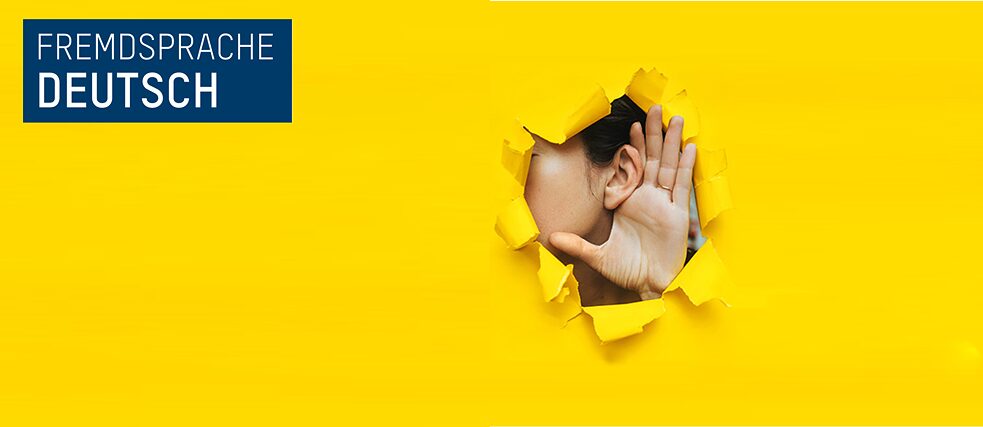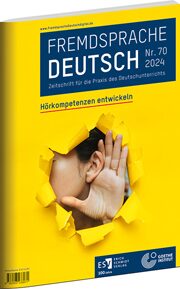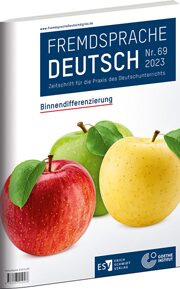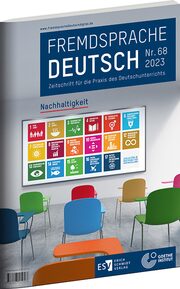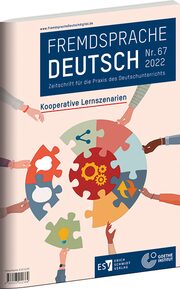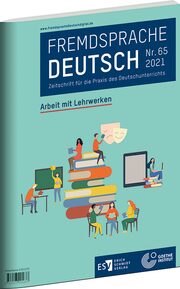Developing listening skills
Listening is a particular challenge when learning a foreign language. This issue aims to encourage you to explore new ways of using it. Micro-listening refers to the ability to identify and understand small linguistic units such as sounds, syllables, words or short phrases. It is the art of filtering out the essentials even in the midst of noise and information overload. This skill is not only of great importance in everyday life, but also plays a decisive role in foreign language teaching. An important technological support is the wide availability of online platforms and apps. These are not only used for pure listening exercises. This is why you will find a lot of additional material for this issue that is available online. A special motivation for learners is, of course, the use of music. Who hasn't translated the lyrics of their favourite band from English as a teenager and almost accidentally trained their vocabulary and listening comprehension in the process?
Order Fremdsprache Deutsch Issue 70 (2024): Developing listening skills
Differentiated Instruction
The current school landscape is characterized by diversity, probably more than any previous generation. Educational institutions face the challenge of supporting every student on their individual educational path. Especially the acquisition of a foreign language plays an important role in personal development and therefore offers the opportunity to recognize the diversity of learners and to support their individual needs. But how can teachers, within the allocated time and with the limited resources available to them, design lessons that meet the needs and abilities of all learners? Especially in a school environment, there is the additional pressure that curricula must be fulfilled and specified standards must be adhered to! This collection of articles presents a range of perspectives and best practice examples from educational practice and research. Selected approaches and methods are presented in various learning environments that show how differentiated Instruction can be implemented successfully.
Order Fremdsprache Deutsch Issue 69 (2023): Differentiated Instruction
Sustainability
Whether it is about the consideration of different social groups, the preservation of healthy livelihoods or the protection of the climate – the sustainability goals are omnipresent and should therefore also be an integral part of the teaching of German. The origin of the authors of this issue is therefore as diverse as the topic: they come from France, Brazil, Russia, Denmark and work in Vietnam, Hungary and North America. The topics are aimed at teachers of German for children and adults in different contexts. Linguistic topics, meta-topics and extra-curricular activities are presented and put up for discussion – from curricula to storytelling. All authors are concerned to highlight the interconnectedness of these aspects from different perspectives. In the articles, you will find many suggestions on fundamental questions and concrete proposals that the authors have already tested in practice.
Order Fremdsprache Deutsch Issue 68 (2023): Sustainability
Cooperative learning scenarios
Tandems, learning buddies, language partnerships – what are the concepts behind these terms and how can they be applied in concrete terms? How do we meet concrete challenges in internationally oriented learning partnerships, for example a big time difference? How can you adapt proven concepts to the needs of your learners? These and other questions are explored in this issue. Much has happened since Fremdsprache Deutsch published an issue on cooperative learning in 2009. As the editors Astrid Buschmann-Göbels and Tushar Chaudhuri explain in their introductory article, the degree of cooperativeness in learning activities within online and blended learning formats is crucial for learning success, not only since the corona pandemic. The practical part of the issue with a total of ten contributions consists of two parts, one dedicated to cooperative learning and the other to language tandem, which requires a high degree of cooperativeness and autonomy of the participants. For both parts, a background contribution provides a theoretical classification.
Order Fremdsprache Deutsch Issue 67 (2022): Cooperative learning scenarios
Interaction – digital and connected
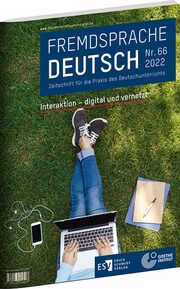 Fremdsprache Deutsch
After Blended Learning (2010) and Teaching with Digital Media (2015), this time we are particularly interested in interaction with digital media. The three core questions on the topic: How can learners be activated with digital media? How can we create authentic communication situations? What possibilities does interaction with digital media offer for the learning process? Within this framework, the contributions of our authors offer numerous suggestions for tools, methods and media: from discussion forums to e-twinning projects, computer games and podcasts, we span the arc to multimodal grammar learning offers and interactive learning videos, 360° media and virtual reality. The fact that educational institutions have had to shift much of their teaching to the digital over the years gives digital interaction a previously unknown importance. The approaches and digital tools presented here can complement or partially replace present forms of interaction. Above all, they potentiate the possibilities of interaction. This insight is not new - but due to the pandemic, we now have the technical infrastructure in many places and an acceptance of digital media on the part of institutions, teachers, learners and parents, which in turn offer space for new things and hopefully invite people to try them out.
Fremdsprache Deutsch
After Blended Learning (2010) and Teaching with Digital Media (2015), this time we are particularly interested in interaction with digital media. The three core questions on the topic: How can learners be activated with digital media? How can we create authentic communication situations? What possibilities does interaction with digital media offer for the learning process? Within this framework, the contributions of our authors offer numerous suggestions for tools, methods and media: from discussion forums to e-twinning projects, computer games and podcasts, we span the arc to multimodal grammar learning offers and interactive learning videos, 360° media and virtual reality. The fact that educational institutions have had to shift much of their teaching to the digital over the years gives digital interaction a previously unknown importance. The approaches and digital tools presented here can complement or partially replace present forms of interaction. Above all, they potentiate the possibilities of interaction. This insight is not new - but due to the pandemic, we now have the technical infrastructure in many places and an acceptance of digital media on the part of institutions, teachers, learners and parents, which in turn offer space for new things and hopefully invite people to try them out.
Order Fremdsprache Deutsch Issue 66 (2022): Interaction – digital and connected
Work with textbooks
Many factors are decisive when using textbooks in German as a foreign language lessons. Who chooses the textbook, and according to what criteria? What limitations have to be taken into account in the specific case? And how do you make the work with its components purposeful and motivating? This issue contains suggestions for a wide variety of situations. The contributions provide concrete suggestions for successful work with and supplementation of textbooks – be it didacticisation that expands the curriculum in connection with literary texts or CLIL or even the successful rededication of self-learning materials to textbooks. Several contributions deal with criteria for selecting textbooks. One article takes us to Thailand, where a textbook was selected for use in schools. Another article describes the use of a catalogue of criteria for selecting textbooks, which was tested at the Lausanne University of Teacher Education. In our subject corner, Angela Lipsky writes with a reflection on gender-appropriate language in textbooks.
Order Fremdsprache Deutsch issue 65 (2021): Work with textbooks
